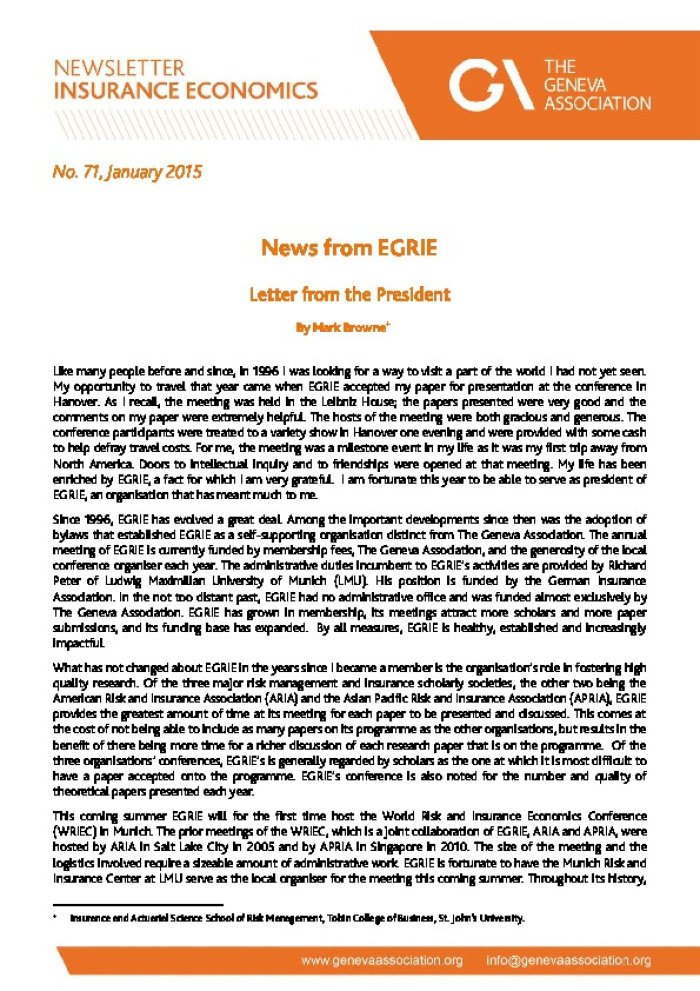News from EGRIE: Letter from the President

No. 71 , January 2015 News from EGRIE Letter from the President By Mark Browne+ Like many people before and since, in 1996 I was looking for a way to visit a part of the world I had not yet seen. My opportunity to travel that year came when EGRIE accepted my paper for presentation at the conference in Hanover. As I recall, the meeting was held in the Leibniz House; the papers presented were very good and the comments on my paper were extremely helpful. The hosts of the meeting were both gracious and generous. The conference participants were treated to a variety show in Hanover one evening and were provided with some cas h to help defray travel costs. For me, the meeting was a milestone event in my l ife as it was my first trip away from North America. Doors to intellectual inquiry and to friendships were opened at that meeting. My life has been enriched by EGRIE, a fact for which I am very grateful. I am fortunate this year to be able to serve as pre sident of EGRIE, an organisation that has meant much to me. Since 1996, EGRIE has evolved a great deal. Among the important developments since then was the adoption of bylaws that established EGRIE as a self- supporting organisation distinc t from The Geneva Association. The annual meeting of EGRIE is currently funded by membership fees, T he Geneva Association, and the generosity of the local conference orga nise r each year. The administrative duties incumbent to EGRIE?s activities are pro vided by Richard Peter of Ludwig Maximilian University of Munich (LMU). His position is funded by the German Insurance Association. In the not too distant past, EGRIE had no administrative office and was funded almost exclusiv ely by The Geneva Association. EGRIE has grown in membership, its meetings attract more scholars and more paper submissions, and its funding base has expanded. By all measures, EGRIE is healthy, established and increasingly impactful. What has not changed about EGRIE in the years since I became a m ember is the organisation?s role in fo stering high quality research. Of the three major risk management and insurance scholarly societies, the other two being the American Risk and Insurance Association (ARIA) and the Asian Pacific Risk and Insurance Assoc iation (APRIA), EGRIE provides the greatest amount of time at its meeting for each paper to be presented and discussed. This comes at the cost of not being able to include as many papers on its programme as the other organ isations, but results in the benef it of there being more time for a richer discussion of each research paper that is on the programme. Of the three organisation s? conferences, EGRIE?s is generally regarded by scholars as the one at which it is most difficult to have a paper accepted onto the programme. EGRIE?s conference is also noted for the number and quality of theoretic al papers presented each year. This coming summer EGRIE will for the first time host the World Risk and Insurance Economics Conference (WRIEC) in Munich. The prior meeti ngs of the WRIEC, which is a joint collaboration of EGRIE, ARIA and APRIA, were hosted by ARIA in Salt Lake City in 2005 and by APRIA in Singapore in 2010. The size of the meeting and the logistics involved require a sizeable amount of administrative work. EGRIE is fortunate to have the Munich Risk and Insurance Center at LMU serve as the local organ iser for t he meeting this coming summer. Throughout its history, + Insurance and Actuarial Science School of Risk Management, Tobin College of Business, St. John's University.